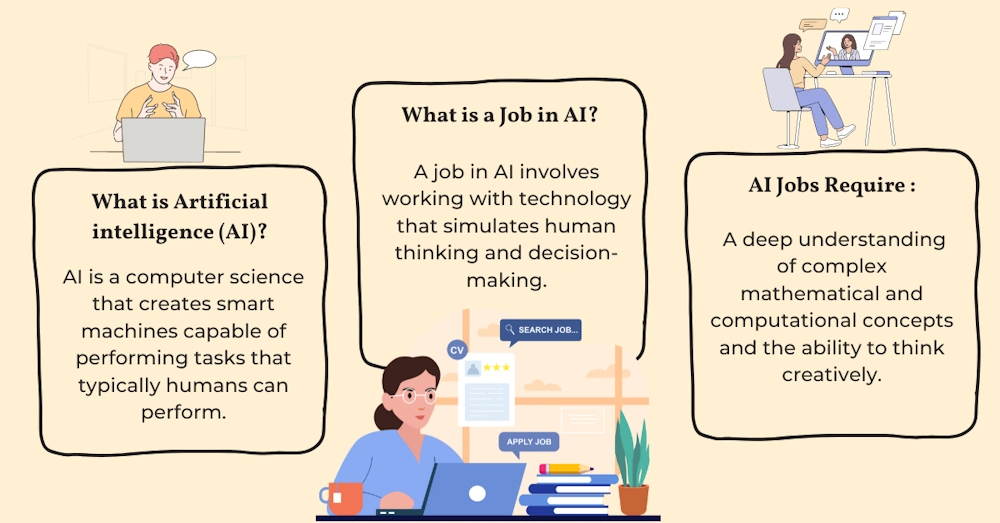 AI Engineer
AI Engineer
Get on board for a job in the exciting AI industry 🚀
AI is set to transform the world, making industries smarter, more efficient, and safer. As technology evolves, AI will continue to integrate seamlessly into our daily lives, improving productivity and innovation. AI engineering has emerged as one of the most promising and dynamic career paths in technology. As AI continues to transform industries worldwide, the demand for skilled AI engineers is expected to grow, perhaps as fast as AI itself.
AI engineering is a multidisciplinary field focused on designing, building, and deploying artificial intelligence systems. It blends software engineering, data science, and machine learning to create practical AI solutions like chatbots, recommendation engines or autonomous systems.
AI Software Engineers, or AI Engineers for short, design and develop intelligent systems that can perform tasks that typically require human intelligence, such as visual perception, speech recognition, decision-making, and language translation. A career in AI software engineering offers high earning potential, diverse job opportunities, opportunities for advancement, and a rapidly growing field with significant future prospects.
For those looking to build a career in AI engineering, now is the perfect time to gain the necessary skills and become a part of this exciting industry!

 Why choose AI Engineering as a Career?
Why choose AI Engineering as a Career?
Companies across industries (tech, healthcare, finance, etc.) need AI to stay competitive. Job postings for AI roles grew 74% annually from 2015–2019 and continue trending upward. In the U.S., entry-level AI engineers earn $100K–$150K, with seniors hitting $200K+ (Glassdoor, 2025 estimates). You could solve real problems; like improving medical diagnostics or creating tools for underserved regions. AI is driving innovation (think self-driving cars, generative AI). Skills here keep you relevant as tech evolves. It’s not just coding—you get to experiment, design, and think big.
The field offers excellent prospects:
- Consistently ranked among the fastest-growing tech careers
- High compensation (median salaries often exceed $120,000 in the US)
- Diverse industry applications (healthcare, finance, retail, entertainment)
- Growing demand in non-tech sectors
Some of the disadvantages to AI Engineering as a career are:
- Steep Learning Curve: Requires math (linear algebra, calculus), programming (Python, TensorFlow), and domain knowledge.
- Fast-Paced: Tools and techniques (e.g., transformers, LLMs) evolve quickly, demanding constant learning.
- Ethical Pressure: You might face dilemmas (e.g., bias in AI models) that require careful navigation.
Be prepared for:
- Rapidly evolving technology landscape
- High expectations for technical breadth and depth
- Balancing innovation with practical implementation
- Addressing ethical considerations and biases
- Explaining complex solutions to non-technical stakeholders
As an AI Engineer, you’d work on:
- Developing and implementing machine learning models and algorithms (e.g., neural networks, NLP models).
- Managing data pipelines (cleaning, processing, and feeding data into models).
- Deploying AI into real-world applications (e.g., websites, apps, robotics).
- Ensuring models are accurate and efficient, making models faster or less resource-intensive.
- Working with cross-functional teams to integrate AI solutions into products or services.
 Your Career as an AI Engineer
Your Career as an AI Engineer
Career Path and Growth
- Education: Typically requires a bachelor's degree in Computer Science, Mathematics, or related fields.
- Skills: Proficiency in programming languages like Python, Java, and C++ and knowledge of machine learning frameworks such as TensorFlow or PyTorch is essential. See below for more.
- Certifications: Optional certifications can enhance career prospects.
- Job Outlook: The demand for AI engineers is high and growing, with a projected increase in AI-related jobs by 2030.
- Industry: Salaries vary by industry, with tech giants like Microsoft and Google offering higher compensation.
- Location: Cities like San Francisco and New York tend to offer higher salaries due to the cost of living and demand for AI talent.
Career Role Components
AI engineers typically work at the intersection of software development, data science, and machine learning. Their responsibilities include:
- Designing and implementing machine learning models
- Creating and maintaining AI infrastructure
- Translating business problems into technical solutions
- Deploying and scaling AI systems
- Ensuring ethical AI implementation
Career Opportunities in AI Engineering
- AI Research Scientist: Develops cutting-edge AI models and algorithms.
- Machine Learning Engineer: Designs and optimizes AI systems for businesses.
- Robotics Engineer: Creates AI-driven robotic systems for various industries.
- Data Scientist: Uses AI to analyze and interpret complex data.
- AI Consultant: Advises companies on AI adoption and integration.
Career Progression
A typical career path might look like this:
- Junior AI Engineer or ML Engineer
- AI Engineer
- Senior AI Engineer
- Lead or Principal AI Engineer
- AI Architect or Director of AI
 Required Skills
Required Skills
To succeed as an AI engineer, you'll need:
Technical Skills
- Experience with cloud computing platforms (AWS, Azure, GCP) and AI development tools.
- Proficiency in programming languages like Python, C++, and JavaScript.
- Building APIs (e.g., Flask backend), deploying to the cloud (AWS, Heroku), and version control (Git).
- Strong foundation in machine learning and deep learning frameworks (TensorFlow, PyTorch).
- Knowledge of AI concepts like algorithms, computer vision, data structures, database management, natural language processing, and reinforcement learning.
Domain Knowledge
- Statistics and mathematics
- Deep learning architectures
- Natural language processing
- Computer vision (for specialized roles)
- Reinforcement learning (for certain applications)
Soft Skills
- Problem-solving aptitude
- Communication skills
- Ethical judgment
- Project management
- Collaboration abilities
 Education Pathways
Education Pathways
Most AI engineers have:
- Bachelor's degree in Computer Science, Data Science, Mathematics, or a related field
- Many positions require or prefer Master's or PhD degrees
- Specialized certifications from cloud providers or universities
- Continuous learning through courses and self-study
- Experience as a software developer
 Salary Ranges
Salary Ranges
By years of experience:
- Entry-Level (0-1 year): Salaries can range from $80,000 to $103,140 per year in the U.S.
- Mid-Level (1-3 years): Average salaries are around $121,513 per year.
- Senior-Level (7+ years): Salaries can reach up to $338,000 per year, with an average of $185,833.
By speciality:
- Machine Learning Engineer: Build and tune models. Median salary: $130K (U.S., 2025).
- AI Software Engineer: Integrate AI into apps/websites. Salary: $120K–$160K.
- Data Scientist: Focus on data-driven insights feeding into AI. Salary: $115K–$150K.
- Research Engineer: Innovate new AI methods. Salary: $150K+ (Ph.D. often needed).
- Specialist Roles: NLP (chatbots, translation), computer vision (image AI), robotics.
 How to Get Started
How to Get Started
Here are some suggestions on how to get started on a career in AI engineering. Perhaps you're a software developer with a strong background in programming languages and databases. You may only need to come up to speed on AI technologies and design and implement some sample projects with AI models. If you're just getting started, you can learn the basics and try your hand at Python.
Step 1: Learn the Basics
- Free: Coursera’s “Machine Learning” by Andrew Ng, Khan Academy (math refreshers).
- Paid: Udacity’s “AI Engineer Nanodegree” ($1K–$2K), DeepLearning. AI specializations.
- Books: “Hands-On Machine Learning” by Géron, “Deep Learning” by Goodfellow.
Step 2: Build Projects
There are some example projects, practical AI projects you can build and learn AI skills.
- Multilingual Chatbot: Extend Flask + Hugging Face code with English/Spanish support.
- AI Website Feature: Add a recommendation system to a website using a simple ML model.
- Portfolio: Host projects on GitHub to show employers.
Step 3: Gain Experience
- Freelance: Offer AI tweaks for websites (e.g., chatbots for small businesses).
- Internships: Apply to tech firms (Google, xAI, startups) or local companies needing AI.
- Contribute: Open-source AI projects (e.g., TensorFlow, Hugging Face).
Step 4: Formalize It (Optional)
- Degree: Computer Science or Data Science (BS/MS). Not required but helps for top-tier roles.
- Certifications: AWS AI/ML, Google Professional ML Engineer.
 A Day in the Life
A Day in the Life
Here's a sample of what to expect on the job as an AI engineer. Your actual day's activities will be as varied as the industry and the position.
😀Morning: Debug a model’s accuracy on new data.
😌Midday: Meet with a team to plan AI deployment on a client’s site.
😒Afternoon: Code an API endpoint, test on a staging server.
😩Evening: Read up on the latest AI paper or tweak a personal project.
 Links
Links
projectpro.io/article/artificial-intelligence-engineer-salary
coursera.org/articles/artificial-intelligence-salary
builtin.com/salaries/us/ai-engineer
groomassocies.com/insights/ai-engineers-how-much-can-you-expect-to-earn-in-2025
coursera.org/articles/ai-engineer-salary
netcomlearning.com/blog/ai-engineer-salary
ziprecruiter.com/Salaries/Artificial-Intelligence-Engineer-Salary
simplilearn.com/tutorials/artificial-intelligence-tutorial/how-to-become-an-ai-engineer